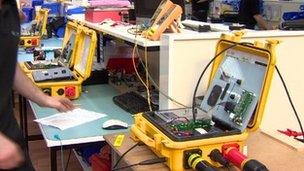Lisburn electronics firm highlights skills shortage in Northern Ireland
- Published

Kelvatek designs and manufactures a range of electronic equipment
A Lisburn electronics company has said a skills shortage in Northern Ireland means it is having to employ specialist engineers from overseas instead of local graduates.
Kelvatek wants to hire 55 design engineers as part of its expansion plans.
However, it said it could not find them in Northern Ireland.
Kelvatek designs and manufactures a range of electronic equipment for the power and rail industries.
It currently employs 130 people and is planning to more than double its workforce over the next 18 months.
Kelvatek chief executive John Cunningham said it could not find the range of design engineers it needs in Northern Ireland.
"We find it virtually impossible to recruit at the moment on the design side," he added.
"There is a complete dearth of engineers and to support that we are being forced to open up design offices in other parts of the world - in Poland, Denmark, Italy, England and Scotland."
The company maintains there is a skills mismatch in Northern Ireland.
Employment and Learning Minister Stephen Farry said "skills were the key driver of the Northern Ireland economy".
"There is an ongoing challenge in terms of trying to ensure we match supply with demand," he said.
"We do need to be working at full efficiency and where there are skill shortages or mismatches that clearly is a problem."
Mr Farry said he had been contacted by engineering companies who had expressed their concerns over skills shortages.
"At present I have asked the Northern Ireland skills advisor Bill McGinnis to do a scoping exercise with me," he said.
"He's currently in the process of talking to engineering companies across Northern Ireland."
Shortages
The minister is currently chairing a working group looking at the information communications technology (ICT) sector and said he was "very willing to consider" something similar for the engineering sector.
Mr Cunningham said universities were not producing anything like the number of design engineers in electrical, mechanical and electronic sectors that industry requires.
"It is so far below the requirement that it is almost laughable," he said.
"We produce, as a society, plenty of doctors, lawyers and teachers, but no engineers and it is engineers we need.
"Manufacturing needs products, products need design engineers.
"It's a catch 22. If you don't produce these design engineers, you cannot build a manufacturing base.
"Without that, you do not have a viable society."
Mr Cunningham said "dramatic steps" had to be taken to "correct this problem".
Mr Farry said action was being taken to tackle the shortages.
"In terms of short term interventions, the question we have to ask is: "Is it possible to run conversion courses, are their people who are close, but not quite there and is it possible to design something over a period of six months that could retrain people to meet the very specific needs of some businesses?" he said.
"In terms of the long-term stuff we have prioritised advanced manufacturing as a priority skill.
"We've increased the number of places at universities, we're seeing an upsurge in applications to both universities in engineering courses."